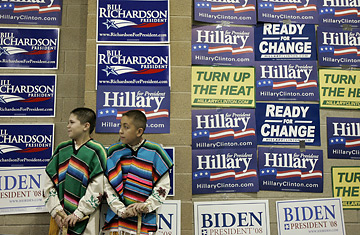
Alex Martinez, left, and Joey Contreras listen to candidates speak before performing at a Nevada Democratic Party mock caucus held at Rancho High School in Las Vegas.
"Wanna Caucus?" asks a hand-made banner laying on a table in the Coronado High School cafeteria in Henderson, Nevada, on a recent Tuesday night. It's six weeks before Nevada becomes the first western state, and fifth state overall, to vote in the 2008 presidential race. More than a hundred suburban Las Vegans have shown up here to "learn how to caucus" after receiving a flier in the mail from the state's Young Democrats organization.
The gathering is just one of hundreds of mock caucus training programs in the state being put on by the parties and candidates' camps. All the players in Nevada know that getting people to go the precincts on January 19 is only half the battle — though not a small one, since the caucus will be held on a holiday (Martin Luther King Jr.) weekend, and many workers in the state's large hospitality industry could potentially have trouble having time off to caucus. In a state that came in 42nd in voter turnout in 2004, getting voters to understand what to do once they find their way to a caucus will also be a major challenge.
Under the guidance of Senate Majority Leader Harry Reid of Nevada, Nevada's caucus was moved up in the hope that this booming part of the country would finally have a say in the presidential nominating process. But until recently, the plan appeared to many to be wishful thinking. Though Republicans followed suit in moving their caucus up as well, the corresponding decisions by Iowa, New Hampshire and South Carolina to schedule their primaries or caucuses even earlier in the 2008 calendar — not to mention the choice by such crucial states as California, Arizona and Colorado to join the flood of states holding their primary on February 5 — stole most of the thunder from Nevada.
The dynamic state of both parties' races, however, has helped give Nevada a boost of late, and residents are starting to believe their caucus might matter after all. "Nevada is sort of the Rodney Dangerfield of national politics," says Ted Jelen, political science professor at UNLV. "I'm not sure how much the national media is taking it seriously, and I'm not sure how many Nevada voters are taking it seriously, but the candidates are taking it seriously."
The fluid nature of the races are mirrored in Nevada, where Clinton leads Obama by 8 points in a recent poll, while Giuliani holds a slight lead over Romney and Huckabee. "Now that it appears nothing will be settled after Iowa and New Hampshire, we could be seen as a tie-breaking momentum-builder," says Las Vegas Sun columnist Jon Ralston. "And the calendar changes give us 10 straight days of attention."
Nevada may play a more important role in the Democratic race. That's partly because the Republicans have their all important South Carolina primary on the very same day (the Dems' is a week later, on the 26th). But it's also because of the demographics of the fast-growing state, which is a sharp contrast to Iowa and New Hampshire. One third of Nevada's 2.5 million people are Hispanics, Asian-Americans and blacks, according to 2004 census figures. Unions — particularly Culinary 226, which includes Strip hospitality workers — have a huge presence here. Culinary alone has some 60,000 members. Even when Hillary Clinton campaigned in Pahrump, a small town outside of Vegas known for its anti-government leanings and several well-known brothels, more than 2,500 people showed up, forcing Clinton organizers, who had only been expecting about 300, to rent a skating rink to accommodate the overflow.
"By any measure Nevada's caucus is significant," says Rory Reid, the Senator's son who is a Clark County (Las Vegas) Commissioner and head of the Nevada Clinton campaign. "It's the first time [in the campaign] a presidential candidate has to stand before a crowd that looks like America."
Reid says that candidates learned to speak Nevadan long before they took the stage at the University of Nevada, Las Vegas for a CNN Democratic debate in November. (All of the candidates mastered the local pronunciation of Nevada, which is Nevaaada, not Nevah-da.) In addition to addressing Nevada-specific issues like the controversial proposed nuclear dump Yucca Mountain, 90 miles northwest of Las Vegas, they've spent the better part of the year speaking to western, Hispanic and labor issues.
"There are issues that are transcendent in the west — water, public resources, public land-83 percent of Nevada land is public," Reid says. "As political messages are developed here, those messages will be used throughout the primaries and general elections."
Back in the high school cafeteria in Henderson where the caucus training is taking place, the trickle-down significance of Nevada's caucus is palpable. "We want to do Nevada proud," Democratic mock caucus organizer Samantha Steelman tells the crowd before starting. In 2004 Kerry won in Clark County 51 percent to 46 percent, but lost the state."I'm telling you we are going to turn Nevada blue at the election!"
Steelman explains caucusing by having the group decide what their favorite movie is. Placards with movie names such as "Star Wars" and "Grease" are placed around the cafeteria, and people are told to stand by their favorite. "This is what you'll do on caucus day," she tells them. ("The Godfather" wins this mock caucus.)
The group — inordinately white and gray-headed, but peppered with young and minorities — is laughing, having fun. Regional field director Robert Disney tells them, "A caucus is a party building activity. Iowa is blue because they've been doing this for so long. This is our chance. We are a purple state. We are going to be blue state. It's a pain to go through, but it's worth it."
